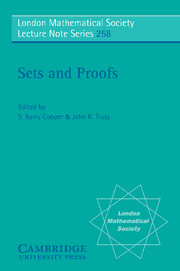Book contents
- Frontmatter
- Contents
- Preface
- An Introduction To Finitary Analyses Of Proof Figures
- What Mathematical Truth Could Not Be – II
- Proof Search in Constructive Logics
- David's Trick
- A Semantical Calculus for Intuitionistic Propositional Logic
- An Iteration Model Violating the Singular Cardinals Hypothesis
- An Introduction to Core Model Theory
- Games of Countable Length
- On the Complexity of the Propositional Calculus
- The Realm of Orinal Analysis
- Covering Properties of Core Models
- Ordinal Systems
- Polish Group Topologies
- Forcing Closed Unbounded Subsets of Nw+1
- First Steps into Metapredicativity in Explicit Mathematics
- What Makes A (Pointwise) Subrecursive Hierarchy Slow Growing?
- Minimality Arguments for Infinite Time Turing Degrees
A Semantical Calculus for Intuitionistic Propositional Logic
Published online by Cambridge University Press: 05 September 2013
- Frontmatter
- Contents
- Preface
- An Introduction To Finitary Analyses Of Proof Figures
- What Mathematical Truth Could Not Be – II
- Proof Search in Constructive Logics
- David's Trick
- A Semantical Calculus for Intuitionistic Propositional Logic
- An Iteration Model Violating the Singular Cardinals Hypothesis
- An Introduction to Core Model Theory
- Games of Countable Length
- On the Complexity of the Propositional Calculus
- The Realm of Orinal Analysis
- Covering Properties of Core Models
- Ordinal Systems
- Polish Group Topologies
- Forcing Closed Unbounded Subsets of Nw+1
- First Steps into Metapredicativity in Explicit Mathematics
- What Makes A (Pointwise) Subrecursive Hierarchy Slow Growing?
- Minimality Arguments for Infinite Time Turing Degrees
Summary
Introduction
Classical propositional logic was founded by George Boole as the theory of logical validity of formulae: a formula is valid, if and only if it is verified (i.e. mapped to 1) by all propositional valuations (i.e. homomorphisms from the algebra of formulae into suitable so called Boolean algebras), if and only if it is not falsified by any such valuation. The well known so called classical tableau calculus is then based on a syntactic analysis of the conditions a propositional valuation has to satisfy in order to falsify a given formula.
If in the course of this analysis conditions arise which no valuation satisfies, vie. both truth values associated to one and the same propositional variable, then the given formula is shown valid. Otherwise the formula is falsified by all valuations which satisfy the conditions.
By this approach validity of sets of formulae (being a property defined using the external concept of a valuation) may be reduced to an internal recursive description of such sets of formulae. (The observation that instead of single formulae one has to consider sets of formulae, so called sequents, is due to Gerhard Gentzen, the most convenient form of such a tableaux calculus is due to Raymond Smullyan.)
- Type
- Chapter
- Information
- Sets and Proofs , pp. 73 - 94Publisher: Cambridge University PressPrint publication year: 1999

